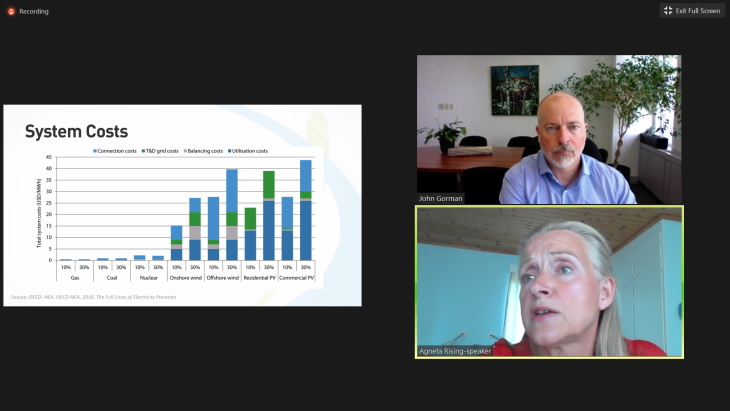CNA President John Gorman and World Nuclear Association Director General Agneta Rising discussed the post-COVID world during a 'fireside chat' webinar, agreeing that the pandemic had underlined the importance of electricity for society.
The transition to a low-carbon economy was difficult before COVID, but is even harder now, Rising noted. All electricity sources will need to work together in future - World Nuclear Association's Harmony goal is for 25% of future electricity to come from nuclear - and system costs must be taken into account in the post-COVID recovery. Rising said the situation had provided "a wake-up call" on the importance of electricity. Particularly in countries with deregulated electricity markets, there has been an assumption that "the market will fix everything", she said. "Now we can see that it does not."
As well as new nuclear construction, refurbishing reactors to ensure long operating periods has been identified as one of the best low-cost options for low-carbon generation, Rising said.
Gorman, pointing to major ongoing reactor refurbishment programmes in Canada, agreed. The programme - which is on time and on budget - is also supporting a "nuclear ecosystem" of a robust and strong industry base which will be used as a platform for Canada to branch into the next nuclear evolution of small modular reactors, he said.
Opportunities and messages
Throughout the crisis, the electricity sector has performed very well, and the nuclear sector exceptionally so, possibly because of its existing culture of safety, procedure, resilience and redundancy of systems, Gorman said.
However, in the Canadian context, the very fact of nuclear's steady and reliable performance could mean its contribution goes unnoticed when it comes to post-COVID stimulus packages, he added. "In an ironic way, those industries that have not performed well … [that] have shown cracks and have been exposed to great risk during this time, they are the sectors that are getting policy attention right now and even financial attention."
The nuclear industry needs to draw attention to its performance, Rising agreed, and this is an opportunity to offer a clean and efficient transition to lower cost generation that also provides employment. This will be a major consideration for many countries as they emerge from the current situation, she said.
"We need to tell the key messages of nuclear resilience, stability and how it can help security of supply," she said, but also pointed to the "super-multiplying effect" of economics and employment. Recent European studies show that every Euro invested in the nuclear sector gives a five-fold return to the economy, while every direct job created in the nuclear sector leads to 3.2 indirect jobs , she said.
"We need to activate ourselves to talk about nuclear energy," Rising said. "We are in a spiral of silence because we think others don't want to talk about it - we have to break out of that spiral." The nuclear industry employs more than one million people in Europe. "That's one million ambassadors for nuclear," she said.
"We need to be telling our story forcefully and factually," Gorman said. The opportunity for people to "revisit" nuclear because of its merits was present before COVID, he said, with growing anxiety about climate change combined with the realisation that the world was not making sufficient progress towards decarbonisation. Post-COVID, there is a desire to ensure that stimulus money is directed towards a clean economy. "Perhaps the pandemic will create even more opportunity, in the sense that we will have to think very carefully where we are to spend stimulus funding," he said.







_15863.jpg)







